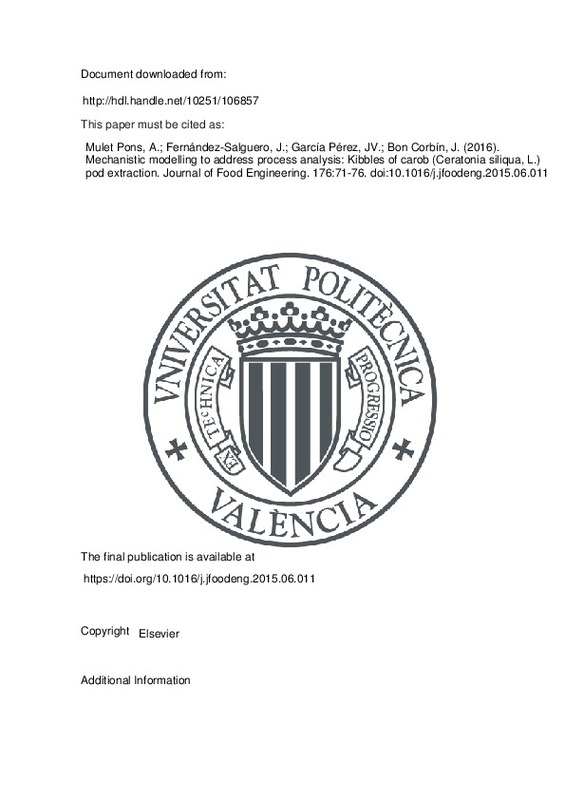JavaScript is disabled for your browser. Some features of this site may not work without it.
Buscar en RiuNet
Listar
Mi cuenta
Estadísticas
Ayuda RiuNet
Admin. UPV
Mechanistic modelling to address process analysis: Kibbles of carob (Ceratonia siliqua, L.) pod extraction
Mostrar el registro sencillo del ítem
Ficheros en el ítem
| dc.contributor.author | Mulet Pons, Antonio
|
es_ES |
| dc.contributor.author | Fernández-Salguero, J.
|
es_ES |
| dc.contributor.author | García Pérez, José Vicente
|
es_ES |
| dc.contributor.author | Bon Corbín, José
|
es_ES |
| dc.date.accessioned | 2018-09-10T09:17:40Z | |
| dc.date.available | 2018-09-10T09:17:40Z | |
| dc.date.issued | 2016 | es_ES |
| dc.identifier.issn | 0260-8774 | es_ES |
| dc.identifier.uri | http://hdl.handle.net/10251/106857 | |
| dc.description.abstract | [EN] The daily challenge involved in operating a process is the attainment of the objectives. Process management requires the use of tools adapted to the system s complexity. In order to obtain real time results, simplified mechanistic modeling offers a way to deal with this. To this end, carob pod (Ceratonia siliqua, L.) kibbles extraction is addressed in this work. They are a source of different, valuable components and have a complex structure and a highly variable concentration of components. The components considered are sugars and soluble polyphenols. Obtaining the extracts with an optimal composition of a particular component, while avoiding or limiting other components in the extract, is a challenge to be addressed. Two steps can be considered: solubilization and diffusion, modeled by means of a first order reaction and by considering slab geometry. The optimal processing time and temperature are obtained by taking a particular kibble size and composition into account | es_ES |
| dc.description.sponsorship | The support from Generalitat Valenciana PROMETEO/2014/005 is acknowledged. | en_EN |
| dc.language | Inglés | es_ES |
| dc.publisher | Elsevier | es_ES |
| dc.relation.ispartof | Journal of Food Engineering | es_ES |
| dc.rights | Reserva de todos los derechos | es_ES |
| dc.subject | Process Management | es_ES |
| dc.subject | Optimization | es_ES |
| dc.subject | Extraction | es_ES |
| dc.subject | Carob | es_ES |
| dc.subject | Ceratonia siliqua | es_ES |
| dc.subject.classification | TECNOLOGIA DE ALIMENTOS | es_ES |
| dc.title | Mechanistic modelling to address process analysis: Kibbles of carob (Ceratonia siliqua, L.) pod extraction | es_ES |
| dc.type | Artículo | es_ES |
| dc.identifier.doi | 10.1016/j.jfoodeng.2015.06.011 | es_ES |
| dc.relation.projectID | info:eu-repo/grantAgreement/GVA//PROMETEOII%2F2014%2F005/ES/Alimentos saludables y competitivos: intensificación de procesos de obtención%2Fpreservación de compuestos bioactivos. Secado e inactivación microbiana/enzimática asistida por ultrasonidos/ | es_ES |
| dc.rights.accessRights | Abierto | es_ES |
| dc.contributor.affiliation | Universitat Politècnica de València. Departamento de Tecnología de Alimentos - Departament de Tecnologia d'Aliments | es_ES |
| dc.description.bibliographicCitation | Mulet Pons, A.; Fernández-Salguero, J.; García Pérez, JV.; Bon Corbín, J. (2016). Mechanistic modelling to address process analysis: Kibbles of carob (Ceratonia siliqua, L.) pod extraction. Journal of Food Engineering. 176:71-76. https://doi.org/10.1016/j.jfoodeng.2015.06.011 | es_ES |
| dc.description.accrualMethod | S | es_ES |
| dc.relation.publisherversion | https://doi.org/10.1016/j.jfoodeng.2015.06.011 | es_ES |
| dc.description.upvformatpinicio | 71 | es_ES |
| dc.description.upvformatpfin | 76 | es_ES |
| dc.type.version | info:eu-repo/semantics/publishedVersion | es_ES |
| dc.description.volume | 176 | es_ES |
| dc.relation.pasarela | S\316599 | es_ES |
| dc.contributor.funder | Generalitat Valenciana | es_ES |







![[Cerrado]](/themes/UPV/images/candado.png)

